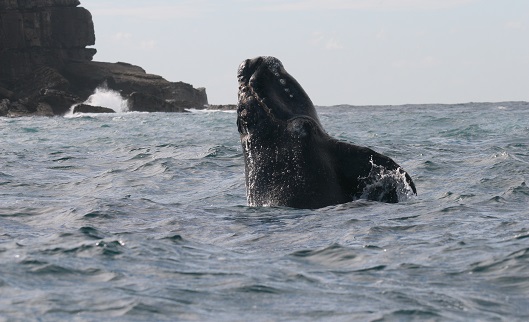Baby whales learn vital traditions from mothers

Cultural traditions among Southern right whale populations are shaping their genetic patterns, according to a study led by the University of St Andrews.
The research, published today (Monday 9 November) in Nature Scientific Reports, reveals that migratory behaviour, learned from a whale’s mother in its first year of life, is an important factor in shaping the genetic structure and recovery of the endangered whale.
Right whales undertake regular migratory journeys spanning thousands of kilometres, from sheltered winter nursery grounds around the southern Australian coast to offshore summer feeding grounds, such as around Antarctica.
The researchers constructed profiles for whales using both DNA markers – which are used to look at population structure and relatedness – and micro-chemical markers – used to look at feeding ground preferences. This was done using small skin samples collected from living whales.
Whales that showed similar feeding ground preferences were more likely to be related, using both maternally-inherited and bi-parentally inherited DNA markers. There were also significant differences in maternally-inherited DNA markers among winter calving grounds, consistent with the idea that there is maternally-directed learning of these migratory habitats.
The work is one of the first to link findings on different migratory habitats across such a large migratory network in living whales.
Lead author, Dr Emma Carroll, of the School of Biology of the University of St Andrews, said: “Migratory culture is where parents transmit preferences in migratory destinations to their offspring through experience, rather than an instinctual basis. It seems that this migratory culture shapes the genetic patterns we see in Australian right whales on both their summer feeding and winter nursery grounds.”
The Southern right whale is a large, long-lived species that is still recovering from intensive whaling during the 19th century. It is endangered in Australia and New Zealand, and in South-east Australia in particular. It is so rare that it took 20 years to collect the samples used in this study.
The research is the result of a long-term collaboration by co-authors from Macquarie University, Australia; University of Auckland, New Zealand; Oregon State University in the USA; Department of Primary Industries, Parks, Water and Environment of Tasmania, Australia; Department of the Environment, Land, Water and Planning of Victoria, Australia; Collegial International St Anne, Quebec, Canada; and Durham University in the UK.
Notes to news editors
‘Cultural traditions across a migratory network shape the genetic structure of southern right whales around Australia and New Zealand’ Carroll et al 2015, is published in Nature Scientific Reportswww.nature.com/articles/srep16182
Photo credit: Southern Right Whale – Rob Harcourt
Issued by the University of St Andrews Communications Office, contactable on 01334 462530 or [email protected].
Category Research